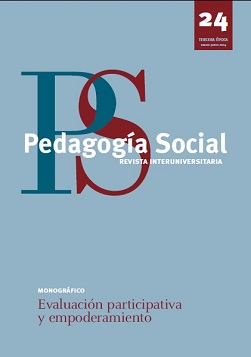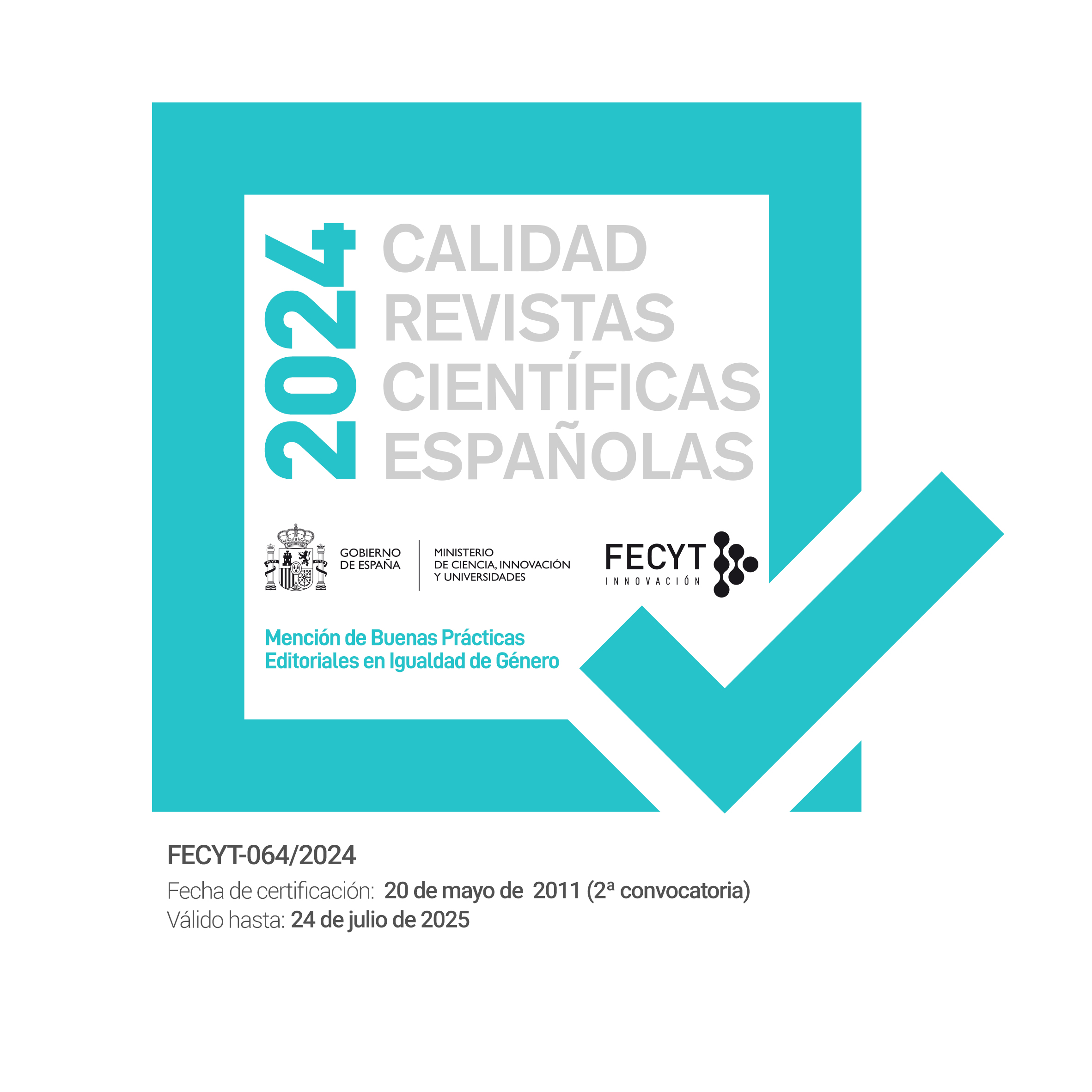Diálogo del profesorado en un desarrollo profesional centrado en el alumnado en una escuela secundaria de los Estados Unidos de América
DOI:
https://doi.org/10.7179/PSRI_2014.24.09Palabras clave:
Calidad docente, responsabilidad educativa, escuelas urbanas, formación de docentes en servicio, prácticas educativasResumen
Esta investigación estudia el impacto sobre un grupo de maestras y administradoras escolares de una iniciativa de desarrollo profesional culturalmente preparada y diseñada para un instituto de enseñanza secundaria hasta bachillerato en proceso de reforma de su organización. Usando paradigmas emergentes de la educación transformadora, diálogo educativo y el marco teórico del Desarrollo Profesional Orientado hacia el Alumno (en inglés, Learner Centered Professional Development), la investigación examina cómo resultaron afectadas las identidades adoptadas por maestras y directivos. Trece profesoras y tres líderes escolares de enseñanza secundaria hasta bachillerato participaron en la iniciativa de formación profesional impartida en un periodo de tres semanas. Los datos de este estudio forman parte de un corpus de datos más amplio que exploran iniciativas de desarrollo profesional en una gran ciudad en la región suroeste de Texas. Se utilizó la herramienta metodológica de análisis narrativo para codificar y analizar los datos. Los resultados apuntan hacia una renovación de identidades profesionales y la revitalización de actitudes y praxis por parte de las maestras y líderes escolares en lo relativo a los alumnos latinos. Los hallazgos indican que las identidades profesionales son transformadoras cuando se implementan desarrollos profesionales culturalmente responsables en los sistemas escolares. Además, los resultados implican que esta iniciativa de desarrollo profesional empodera a las maestras y administradoras escolares, transforma sistemas de creencias, y proporciona un conocimiento y entendimiento profundo en cuanto a prácticas pedagógicas culturalmente responsivas y de liderazgo, que resultan básicas a la hora de trabajar con estudiantes latinos. Más aún, los hallazgos sirven como catalizador para estudios futuros cuya meta es explorar cómo estas iniciativas de desarrollo profesional influyen en el índice de permanencia de maestros y administradores en sistemas educativos desde pre-escolar hasta bachillerato.
Descargas
Citas
Alvarez Gutiérrez, L. (2014). Youth Social Justice Engagement in the Face of Anti-Latina/o immigrant Illegitimacy. The Urban Review, 46, 3. DOI: 10.1007/s11256-013-0269-y
Alvarez Gutiérrez, L. (2013). Costo alto de política anti-imigrante sobre la familia y educación: The adverse consequences of anti-Latino immigration laws [Special Issue]. Theory Into Practice: Educational policy and youth in the 21st century, 52(3), 169-179.
Alvarez Gutiérrez, L. & Rios, F. (2012). La Política Vecindaria: A macro to micro lens on immigrant newcomer students in US schools. In S. Hughes and T. Berry (Eds.), The Evolving Significance of Race: Living, Learning, and Teaching. New Jersey, NJ: Hampton Press.
American Psychological Association, Work Group of the Board of Educational Affairs. (1997). Learner-centered psychological principles: A framework for school reform and redesign. Washington, DC: Author.
Borko, H. (2004). Professional development and teacher learning. Mapping the terrain. Educational Researcher, 33(8), 3-15.
Boyatzis, R.E. (1998). Thematic Analysis and code development: Transforming Qualitative Information. Thousand Oaks, CA: Sage Publications.
Clark, E. R. & Flores, B.B. (2001). Who Am I? The Social Construction of ethnic identity and Self perceptions of bilingual preservice teachers. The Urban Review, 33 (2), 69-86.
Darling-Hammond, L. (2010). The flat world and education: How America’s commitment to equity will determine our future. New York, NY: Teachers College Press.
Delpit, L.D. (1995). Other people’s children: Cultural conflict in the classroom. New York, NY: New York Free Press.
Emerson, R., Fretz, R., & Shaw, L. (1995). Writing ethnographic fieldnotes. Chicago, IL: University of Chicago Press.
Fantini, M.D. (1986). Regaining excellence in education. Columbus, OH: Merrill.
Flores, B. B., Sheets, R. H., & Clark, E. R., (2011). Educar para transforma: Preparing teachers for bilingual student populations. New York, NY: Routledge.
Frasier, M. M., Hunsaker, S. L., Lee, J., Finley, V. S., Frank, E., Garcia, J. H., & Martin, D. (1995). Educator’s perceptions of barriers to the identification of gifted children from economically disadvantaged and limited English proficient backgrounds (RM95216). Storrs, CT: The National Research Center on the Gifted and Talented, University of Connecticut. 16.
Freire, P. (1994). Pedagogy of the oppressed. New Revised 20th Anniversary Edition. New York, NY: Continuum.
Freire, P. (1994). Pedagogy of hope: Reliving pedagogy of the oppressed. New York, NY: Continuum.
French, K. B. (2012). Instructor’s Manual for Nieto & Bode: Affirming Diversity: The Sociopolicial context of multicultural education (5th Edition). Boston, MA: Pearson A&B.
Fry, R. & Taylor, P. (2012). High School Drop-out Rate at Record Low Hispanic High School Graduates Pass Whites in Rate of College Enrollment. Washington, DC: Pew Hispanic Center.
Gay, G. (2000). Culturally responsive teaching: Theory, research, and practice. New York, NY: Teachers College Press.
Goldstein, J. (2011). Peer review and teacher leadership: Linking professionalism and accountability. New York, NY: Teachers College Press.
González, N., Moll, L. C., & Amanti, C. (1995). Funds of knowledge for teaching in Latino households. Urban Education, 29(4), 443-470.
Hightower, A.M., Delgado, R. C., Lloyd, S.C., Wittenstein, R., Sellers, K., Swanson, C.B. (2011). Improving Student Learning By Supporting Quality Teaching: Key issues, effective strategies. Bethesda, MD: Editorial Projects in Education, INC. By Supporting Quality Teaching: A Survey of School Finan education: The report of the AERA panel on research on teacher education (pp. 477-548). Mahwah, NJ: Erlbaum/AERA.
Lee, T. S., & Quijada Cerecer, P.D. (2010). (Re)claiming Native youth knowledge: Engaging in socio-culturally responsive teaching and relationships, Multicultural Perspectives, 12(4), 199-205.
McCombs, B. L. (2003). A framework for the redesign of K-12 education in the context of current educational reform. Theory into Practice, 42, 93-101.
McCombs, B.L., & Whisler, J.S. (2007). The Learner-Centered classroom and school: Strategies for increasing student motivation and achievement. San Francisco, CA: Jossey-Bass.
McLaren, P. (2003). Life in schools: An introduction to critical pedagogy in the foundations of education (4thed.). Boston, MA: Allyn and Bacon.
Miles, M., & Huberman, A. (1994). Qualitative data analysis (2nd ed.). Thousand Oaks, CA: Sage.
Miller, T. (2011). Partnering for Education Reform. Presentation at the Church of God in Christ’s International Convention. Huston, Texas.
Perreault, G. (2000). The classroom impact of high-stress testing. Education, 120 (4), 705-710.
Polly, D. & Hannafin, M.J. (2011). Examining how learner-centered professional development influences teachers’ espoused and enacted practices. The Journal of Educational Research, 104, 120-130. DOI: 10.1080/00220671003636737.
Polly, D. & Hannafin, M.J (2010). Technology’s role in revisioning learner-centered professional development. Educational Technology and Development, 58, 537-571. DOI: 10.1007/s11423-009-9146-5
Richman, C.L., Boveslky, S., Kroovand, N., Vacca, J. & West, T. (1997). Racism 102: The Classroom. Journal of Black Psychology, 23, 378-387. DOI: 10.1177/00957984970234005
Saltman, K. J. (2000). Collateral damage: Corporatizing public schools— A threat to democracy. New York, NY: Rowman & Littlefield.
Schultz, K. (2003). Listening: A framework for teaching across differences. New York City, NY: Teachers College.
Sergiovanni, T. (2000). The life world of leadership: Creating culture, community, and personal meaning in our schools. San Francisco: Jossey Bass.
Stage, F.K., Muller, P.A., Kinzie, J., & Simmons, A. (1998). Creating Learning Centered Classrooms: what does learning theory have to say? ASHE-ERIC Higher Education Report, 26,(4). George Washington University Graduate School of Education and Human Development.
Tate, D. (2008). Schools for all campaign: The school bias and pushout problem. ACLU of Northern California.
Tatum, B. (1997). Why are all the Black kids sitting together in the cafeteria? New York, NY: Basic Books.
U.S. Department of Education, National Center for Education Statistics. (2012). Digest of Education Statistics, 2011 (NCES 2012-001). Introduction and Chapter 2: U.S. Department of Education, National Center for Education Statistics, Schools and Staffing Survey, Teacher Data Files, 2007–08.
U.S. Department of Education. (2011). The Condition of Education. Retrieved September 30, 2013, from http://nces.ed.gov/programs/coe/introduction2.asp
Weisman, E. M. (2001). Bicultural identity and language attitudes perspectives of four Latina teachers. Urban Education,
(2), 203-225.
Yin, R. K. (1994). Case study research. Thousand Oaks, CA: Sage Publications.
Zeek, C., Foote, M., & Walker, C. (2001). Teacher stories and transactional inquiry: Hearing the voices of mentor teachers. Journal of Teacher Education, 52(5), 377–385.
Zeichner, K.M. & Liston, D. P. (2014). Reflective teaching: An introduction. New York, NY: Routledge.
Descargas
Publicado
Cómo citar
Número
Sección
Licencia
Derechos de autor 2014 Pedagogía social. Revista interuniversitaria

Esta obra está bajo una licencia Creative Commons Reconocimiento-NoComercial 3.0 Unported.
Derechos de reproducción y archivo
La versión publicada de los artículos podrá ser autoarchivada por sus autores en repositorios institucionales y temáticos de acceso abierto. No obstante la reutilización total o parcial de los mismos en nuevos trabajos o publicaciones deberá ser autorizada por Pedagogía Social. Revista Interuniversitaria.
Los trabajos publicados deberán ser citados incluyendo el título de la Revista, Pedagogía Social. Revista Interuniversitaria, nº, páginas y año de publicación.
Responsabilidades éticas
Pedagogía Social. Revista Interuniversitaria no acepta material publicado anteriormente en otros documentos. Los/as autores/as son responsables de obtener los permisos oportunos para reproducir parcialmente material de otras publicaciones y citar correctamente su procedencia. Estos permisos deben solicitarse tanto al autor/a como a la editorial que ha publicado dicho material.
Es obligación de Pedagogía Social. Revista Interuniversitaria detectar y denunciar prácticas fraudulentas.
En la lista de autores/as firmantes deben figurar únicamente aquellas personas que han contribuido intelectualmente al desarrollo del trabajo.
La revista espera que los/as autores/as declaren cualquier asociación comercial que pueda suponer un conflicto de intereses en conexión con el artículo remitido.
Los autores deben mencionar en el manuscrito, preferentemente en el apartado del método, que los procedimientos utilizados en los muestreos y controles han sido realizados tras la obtención de consentimiento informado.
La revista no utilizará ninguno de los trabajos recibidos con otro fin que no sea el de los objetivos descritos en estas normas.
Aviso de derechos de autor/a
© Pedagogía Social. Revista Interuniversitaria. Los originales publicados en las ediciones impresa y electrónica de esta Revista son propiedad del Pedagogía Social. Revista Interuniversitaria, siendo necesario citar la procedencia en cualquier reproducción parcial o total.
Salvo indicación contraria, todos los contenidos de la edición electrónica se distribuyen bajo una licencia de uso y distribución “Creative Commons Reconocimiento-No Comercial 3.0 España” (CC-by-nc). Puede consultar desde aquí la versión informativa y el texto legal de la licencia. Esta circunstancia ha de hacerse constar expresamente de esta forma cuando sea necesario.






